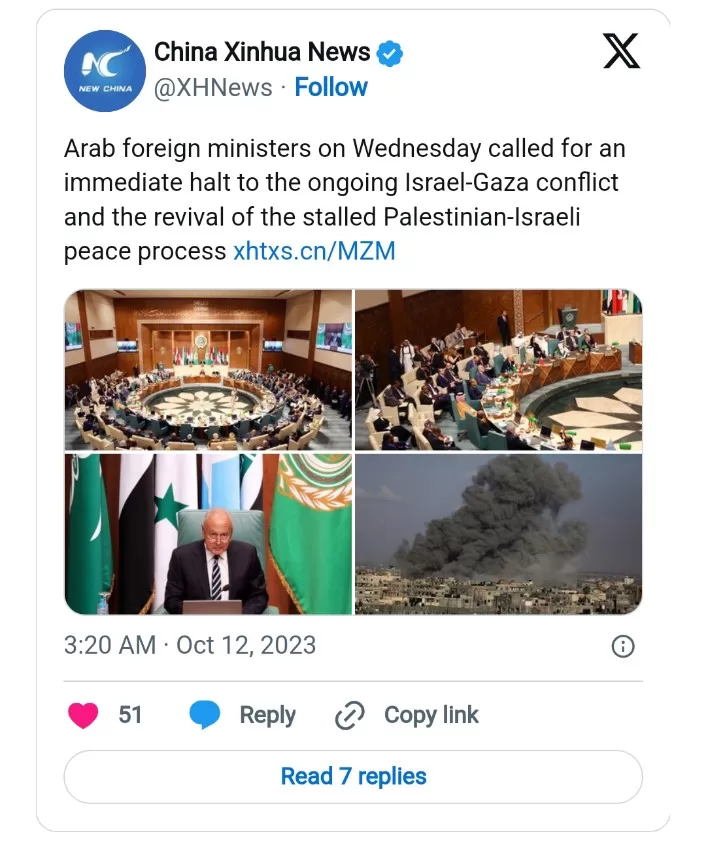In Jerusalem, Israel persisted in its relentless assault on Hamas targets within the Gaza Strip, as Prime Minister Benjamin Netanyahu and political rival Benny Gantz made a significant announcement. They jointly declared the formation of an emergency government to oversee the current conflict, which has already exacted a heavy toll in human lives.
The Israeli Prime Minister and centrist leader Benny Gantz, a former defense minister, set aside their acrimonious political divisions to unite in the creation of a government and a war cabinet. This move was prompted by Tel Aviv’s preparations for a severe ground offensive, one that Israeli officials have ominously suggested could transform Gaza into a veritable “tent city.”
This three-member “war cabinet” comprises Netanyahu, Gantz, and Defense Minister Yoav Gallant. Simultaneously, even as Israel readied for a ground incursion into Gaza, it faced the looming specter of a multi-front war. Rocket attacks targeting Israel emanated from militant groups in neighboring Lebanon and Syria.
Concurrently, growing apprehension surrounds the escalating humanitarian crisis in war-ravaged Gaza. Here, Israel has razed over 1,000 structures and imposed a comprehensive blockade, resulting in the deprivation of water, food, and energy for 2.3 million people.
Reports from Gaza officials reveal a harrowing toll of more than 1,100 fatalities and over 5,000 casualties due to Israel’s relentless campaign of airstrikes and artillery barrages on this densely populated Palestinian enclave. Adding to the plight, the sole power plant in Gaza ceased operation when it depleted its fuel reserves on Wednesday.
Notably, more than 260,000 Gaza residents have been compelled to flee their homes, as indicated by a report from a United Nations aid agency.
Moreover, in a troubling parallel development, Israeli security forces have reportedly killed at least 27 Palestinians in the occupied West Bank since the onset of the conflict on Saturday. As of Wednesday, military checkpoints remained sealed, and various parts of the West Bank found themselves blocked by earthworks, severely constraining the movement of its inhabitants.

The Palestinian Authority (PA), responsible for limited governance in the occupied West Bank, is governed by the Fatah faction, a rival to the ruling Hamas in Gaza.
Simultaneously, diplomatic endeavors have reached a fever pitch as international and regional powers scramble to avert a broader conflagration in the volatile Middle East.
On Wednesday, Arab foreign ministers concluded an emergency meeting in Cairo by reaffirming the paramount importance of Israel’s compliance with its international legal obligations as an occupying power concerning the Palestinian territories.

The United States has initiated its own measures in response to the crisis. An aircraft carrier has been redirected to the eastern Mediterranean, and Secretary of State Antony Blinken is en route to Israel for what he terms a ‘solidarity mission.’ Additionally, U.S. aircraft have delivered “advanced armaments” to Israel’s Nevatim Airbase in the southern part of the country, as confirmed by the Israeli army.
Meanwhile, President Recep Tayyip Erdogan of Turkey has strongly criticized Israel, accusing it of employing “shameful methods,” including the targeting of civilian sites, the loss of civilian lives, and the obstruction of humanitarian assistance. Turkey has offered to mediate in the conflict, with Erdogan and his foreign minister engaging in discussions with various regional powers, the United States, and other concerned parties. However, Israel’s envoy to Ankara has expressed that it is premature to consider mediation efforts at this stage.







